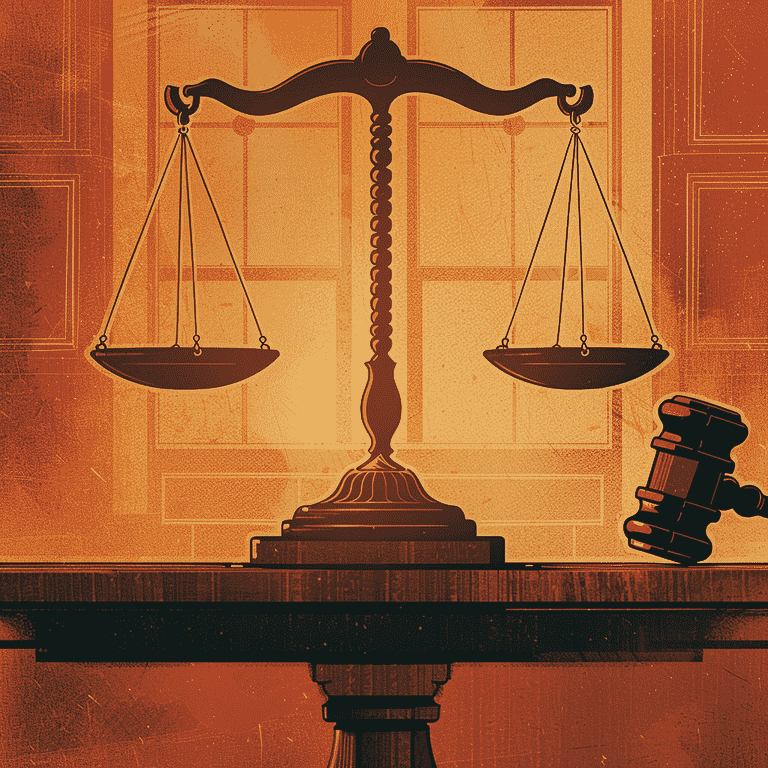Las Vegas is the city that never sleeps. There, the results of attempted murder charges are serious and far-reaching. It is crucial to understand the legal results of such a charge. This is important for anyone facing the accusations or seeking to learn about the law. Attempted murder evokes fear and curiosity. It comes with a complex legal process and a range of potential sentences. They can alter a person’s life. This guide aims to shed light on these aspects. It will provide clarity and insight into what attempted murder means in the eyes of Las Vegas law.

Legal Definition of Attempted Murder in Las Vegas
When talking about attempted murder, you must first say what sets it apart from other crimes. This distinction is not just academic. It is crucial in applying the law and administering justice.
Distinction between attempted murder and other violent crimes
Differences from actual murder
Actual murder is the successful taking of someone’s life. Attempted murder is the intent to kill that is not fulfilled. This fundamental difference significantly impacts the legal approach and sentencing.
Differences from assault and battery
Assault and battery can sometimes come before or come with an attempt on someone’s life. But, attempted murder is specifically marked by the intent to end a life. It is a much worse offense with harsher penalties.
Specific criteria for a charge of attempted murder
To be charged with attempted murder, authorities must meet specific criteria. These include:
Intent: There must be a clear intention to kill another person. This intent can be demonstrated through actions or explicit statements.
Action taken towards committing murder: There must be some step taken beyond mere planning or preparation that directly advances the intent to kill.

Nevada Law on Attempted Murder
Understanding Nevada’s laws is essential. They explain how Las Vegas handles attempted murder.
State statutes governing attempted murder
Nevada Revised Statutes (NRS) provide the law for defining and prosecuting attempted murder. These statutes say what is attempted murder. They also give the penalties for those convicted.
Classification of attempted murder under Nevada law
Nevada law has first and second-degree attempted murder. Each has its own implications and sentencing guidelines.
First-degree attempted murder: This involves premeditation and deliberate planning to commit murder.
Second-degree attempted murder: This category covers acts of attempted murder that are impulsive or without premeditation.
The legal definitions and classifications are complex. They show how hard it is to charge attempted murder. It also shows the importance of understanding Nevada law. Each case is unique, with nuances influencing the legal process and outcome. As we delve deeper into sentencing guidelines and the legal process, remember that real justice rests on using these laws exactly.

Sentencing Guidelines for Attempted Murder in Las Vegas
Understanding the guidelines for attempted murder in Las Vegas is hard. Many factors shape them. The guidelines are not just numbers. They represent the balance between punishment and rehab. They also protect society and acknowledge the gravity of the crime.
Factors influencing sentencing
Several factors come into play when determining the sentence for attempted murder. These include:
Use of a deadly weapon: The involvement of a weapon can significantly increase the severity of the sentence.
Victim’s identity: Cases involving certain victims, like police officers or minors, often result in harsher penalties.
Consider these factors. The authorities weigh the circumstances of the crime. This ensures the punishment fits both the crime and its context.
Range of sentences under Nevada law
The law sets a range of possible sentences for attempted murder. The range can vary widely based on the specifics of the case:
Minimum and maximum penalties: These can range from several years in prison to life sentences, depending on the degree of the attempt and other aggravating factors.
Probation possibilities and conditions: In some cases, probation may be an option, but it comes with strict conditions and is not commonly granted for severe offenses like attempted murder.
Enhancements and aggravating factors
Certain elements can enhance the severity of the sentence:
Hate crime enhancements: If the attempted murder was motivated by bias (e.g., race, religion), the sentence could be significantly increased.
Prior criminal history: A defendant’s previous criminal record can also impact the sentencing, with repeat offenders facing stiffer penalties.

Legal Process and Rights
The legal process is daunting for those charged with attempted murder in Las Vegas. It is also complex. You must understand your rights. You must also know the stages of the legal process. This knowledge is crucial for navigating this tough time.
Arrest and charges for attempted murder
The journey through the legal system begins with the arrest. Then comes formal charges. This process includes:
What to expect during the arrest process: Police will take the suspect into custody, read them their rights, and explain the charges against them.
How charges are formally presented: Charges are officially brought during an arraignment, where the defendant hears the charges and enters a plea.
The role of defense in an attempted murder case
Crafting a defense strategy is paramount:
Building a defense strategy involves gathering evidence, interviewing witnesses, and constructing a legal argument to challenge the prosecution’s case.
Possible defenses against attempted murder charges: Defenses may include proving lack of intent, self-defense, or demonstrating that no substantial step towards committing murder was taken.
Trial process for an attempted murder charge
The trial is the arena where the fate of the defendant is often decided:
Pre-trial motions and hearings: These proceedings determine what evidence will be admissible and set the groundwork for the trial.
Jury selection and trial proceedings: Selecting a fair jury is critical, followed by presenting evidence, witness testimonies, and finally, the jury’s verdict.
The legal process is a marathon, not a sprint. Those facing charges need to understand each step. Exercising their rights can greatly affect the outcome. Legal representation is not just a benefit. It is a necessity for ensuring that those rights are fully protected and used.

Impact of Conviction Beyond Sentencing
The repercussions of an attempted murder conviction in Las Vegas extend far beyond the initial sentence. These long-term consequences ripple through various aspects of a person’s life, underscoring the importance of understanding the full impact of a conviction.
Long-term consequences of an attempted murder conviction
A conviction can alter the trajectory of one’s life in several profound ways:
- Felony record implications: A felony conviction can limit voting rights, firearm ownership, and even the ability to serve on a jury.
- Impact on employment and housing opportunities: Many employers and landlords are wary of renting to or hiring someone with a violent criminal record, which can make finding a job or a place to live exceedingly difficult.
Possible restitution and fines
Financial obligations can also stem from a conviction:
- Compensating victims: Courts often order those convicted of attempted murder to pay restitution to their victims, covering medical bills, lost wages, and other expenses incurred as a result of the crime.
- Court-imposed fines and fees: Beyond restitution, significant fines and legal fees can be levied, further impacting a person’s financial stability.

Seeking Legal Assistance
Facing attempted murder charges without competent legal representation is akin to navigating a stormy sea without a compass. The expertise of a seasoned defense attorney can be the beacon of hope in such tumultuous times.
The importance of hiring a defense attorney
The role of a defense attorney is multifaceted and invaluable:
- Expertise in criminal defense: A lawyer specialized in criminal defense understands the nuances of the law and will use this knowledge to build a strong defense.
- Navigating the legal system: The legal process is complex and intimidating. A defense attorney guides their clients through each step, ensuring they understand their rights and the implications of their decisions.
What to look for in a defense attorney
Selecting the right defense attorney is crucial. Here are some qualities and qualifications to consider:
- Experience with attempted murder cases: An attorney with a track record of defending against attempted murder charges will be more familiar with the best strategies and defenses.
- Track record of success in court: Look for an attorney who has successfully obtained favorable outcomes for their clients, whether through acquittals, reduced charges, or lighter sentences.

Breaking It All Down
The journey through the legal implications of an attempted murder charge in Las Vegas is hard. It is full of challenges. It is also full of complexities. The charge has many nuances. You must understand them. You must also navigate the sentencing guidelines and the legal process. The need for deep knowledge and good legal representation is very important. This guide aims to show the way. It is for those seeking to understand the seriousness of attempted murder charges. It shows the key role of experienced defense attorneys. They navigate these turbulent waters. Remember: knowledge is power in legal battles. A skilled advocate can make all the difference.

Frequently Asked Questions
What’s the difference between attempted murder and manslaughter in Las Vegas?
Attempted murder involves intending to kill without completing the act, while manslaughter results in death without premeditation, often in the heat of the moment or through negligence.
Can attempted murder charges be dropped or reduced in Las Vegas?
Yes, various factors like insufficient evidence, witness credibility, or plea bargaining by a defense attorney can lead to dropping or reducing charges.
What role do eyewitnesses play in an attempted murder trial?
Eyewitness testimony is crucial for establishing the defendant’s intent and actions, though the defense may challenge their reliability.
How does the presence of mental illness affect an attempted murder case?
Mental illness can impact the case by affecting the defendant’s ability to form intent or stand trial, potentially leading to alternative sentencing or treatment options.
Is it possible to face federal charges for attempted murder in Las Vegas?
While state law usually handles attempted murder cases, specific circumstances like crimes on federal property or involving federal officials may result in federal charges.
How does self-defense play into attempted murder charges?
Self-defense can be a valid defense against attempted murder charges if the defendant proves they were responding to an immediate threat to their life or safety.
What is the statute of limitations for attempted murder in Las Vegas?
Nevada has no statute of limitations for attempted murder, allowing charges to be filed at any time after the crime is committed.
Can a victim of attempted murder sue for damages in civil court?
Yes, victims can sue the perpetrator for damages resulting from the attempted murder, including medical expenses, lost wages, and pain.
How does juvenile status affect attempted murder charges?
Juveniles charged with attempted murder may face different legal procedures and sentences, with options for rehabilitation, though severe cases may be transferred to adult court.
What are the potential immigration consequences of an attempted murder conviction?
Non-citizens convicted of attempted murder may face deportation, denial of re-entry, and bar from naturalization by authorities.

Glossary
Attempted Murder: A criminal offense involving the intention to kill another person without successful completion of the act.
Assault and Battery: Legal terms where assault refers to the threat or attempt to inflict physical harm, while battery refers to the actual material impact on another person.
Nevada Revised Statutes (NRS): The codified laws governing the state of Nevada, which include regulations, definitions, and penalties for criminal acts.
First-degree Attempted Murder: An attempted murder charge characterized by premeditation or planning before trying to commit the act.
Second-degree Attempted Murder: An attempted murder charge that lacks premeditation, often resulting from spontaneous or impulsive actions.
Deadly Weapon: Any object that is used or intended to be used in a way that can cause death or serious bodily harm.
Probation: A sentencing alternative to imprisonment where the offender remains under court supervision for a specified period, subject to certain conditions.
Restitution: A court-ordered payment by the defendant to the victim for losses or damages resulting from a crime.
Felony Record: A permanent record resulting from conviction of a felony offense, which can impact various aspects of an individual’s life, including employment and civil rights.
Defense Attorney: A lawyer specializing in the defense of individuals and companies charged with criminal conduct.
Plea Bargaining: A legal process where the defendant and prosecutor negotiate a deal, often involving the defendant pleading guilty to a lesser charge in exchange for a lighter sentence.
Eyewitness Testimony: Evidence provided by individuals who witnessed the crime, offering descriptions of events or the accused.
Mental Illness: A condition affecting a person’s thinking, feeling, behavior, or mood, which may impact their legal responsibility or competency to stand trial.
Federal Charges: Criminal charges filed under U.S. federal law, as opposed to state law, often for crimes that cross state lines or involve federal property.
Self-defense: A legal defense arguing that the accused was justified in committing what would otherwise be a criminal act to protect themselves from immediate harm.
Statute of Limitations: A law prescribing the maximum time after an event within which legal proceedings may be initiated.
Civil Lawsuit: A legal process by which a person (plaintiff) can bring a lawsuit against another person (defendant) for harm or injury.
Juvenile: A person under 18, often subject to different legal procedures and protections in the criminal justice system.
Immigration Consequences: Legal repercussions affecting an individual’s immigration status, including deportation or ineligibility for citizenship, resulting from criminal convictions.

Additional Resources for You
Double Jeopardy: Understand the protections against being tried for the same crime twice.
Hung Jury: Learn what happens when a jury cannot agree on a verdict.
Circumstantial Evidence: Dive into how evidence that relies on an inference to connect it to a conclusion of fact can impact a case.
Indicted Vs Charged: Clarify the difference between being indicted and being charged with a crime.
Difference Between Jail And Prison: Understand the distinctions between these two types of incarceration.
What Are Miranda Rights: Get informed about the critical rights of the accused during an arrest.
How To Check If You Have An Outstanding Warrant: Find out the steps to determine if there’s an outstanding warrant for your arrest.
What To Look For In A Criminal Defense Lawyer: Learn what qualities and qualifications are essential in a defense attorney.
Possible Ways To Reduce A Felony Charge: Explore strategies that might lead to a reduction in charges.
Should You Accept A Plea Bargain: Consider the pros and cons of accepting a plea deal.

Outside Resources for You
American Bar Association (ABA): A premier legal organization that provides resources on various aspects of law and legal profession, including public education and legal guides.
National Association of Criminal Defense Lawyers (NACDL): An organization focused on ensuring justice and due process for persons accused of crime, as well as fostering the integrity of the legal profession.
FindLaw: Offers a broad range of free articles, legal documents, and local lawyer information, making legal research easier for professionals and the public.
Justia: Provides free case law, codes, regulations, legal articles, and legal blog and twitterer directories, as well as additional community resources.
National Legal Aid & Defender Association (NLADA): Dedicated to providing legal representation to those who cannot afford it, this site also offers resources on criminal defense.
The Innocence Project: Works to exonerate the wrongly convicted through DNA testing and reforms the criminal justice system to prevent future injustices.
ACLU – American Civil Liberties Union: Focuses on defending and preserving the individual rights and liberties guaranteed to every person in this country by the Constitution and laws of the United States.

A Special Message from Our Lead Attorney, Molly Rosenblum Allen, Esq

Dear Reader,
Thank you for taking the time to engage with our resources. I hope you found the information insightful. It should help you understand the complexity of the legal challenges you might face. At The Rosenblum Allen Law Firm, we commit to providing legal representation. We also provide education that empowers our clients and the community.
Knowing your rights and the details of the law is the first step. It helps you navigate the legal system well. But, every situation is unique, and personalized legal advice is invaluable. Whether you’re facing charges or seeking legal guidance, we’re here to help. Or, if you have questions about the law, we’re here to help.
I invite you to schedule a free consultation with me, Molly Rosenblum Allen, Esq. We can discuss your legal needs and how we can help you. Please call us at (702) 433-2889 to schedule your appointment. During this meeting, we can explore your options and answer your questions. We will outline strategies tailored to your situation.
Thank you again for your interest in our resources. We look forward to serving you and assisting with your legal needs.
Warm regards,
Molly Rosenblum Allen, Esq.



